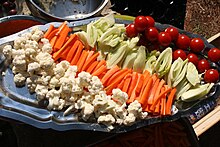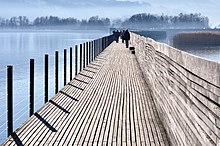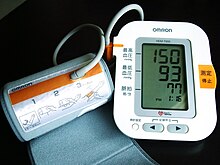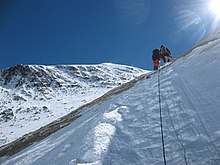Every year, millions of people with high blood pressure travel for business, leisure and family functions. People with high blood pressure deal with all the issues other travelers contend with, but also others unique to their situations. In order to have as safe, comfortable and enjoyable a trip as possible, these challenges need to be addressed.
|
Disclaimer: This article addresses a condition that may be dangerous and attempts to give readers some practical suggestions to consider, but in no way should anything in this article be construed to be medical advice. Every person with hypertension is unique, and in order to be as safe as possible, you must seek specific advice from a doctor and heed it. |
Get in and around
[edit]
Take all documentation with you that you may need if you go to see a doctor. Carry your medicines in the original packaging when crossing borders and have the related prescriptions to show that the medicines are indeed yours.
If you have a choice, especially if you also have a heart condition, you may want to avoid destinations with very hot or cold weather or at high altitudes. If going, in addition to the normal precautions described in Cold weather and Hot weather, consult a trusted physician when planning your travel. You should probably consider limiting your time outdoors when weather is particularly cold or hot.
By plane
[edit]If you need to travel by plane, there are special issues you must deal with if you have high blood pressure. First, you must not count on being served low-salt food on the plane, though on many flights, you might be fed a meal or snack that includes an undressed salad or crudités. But while bringing your own food onto the plane is a good idea for anyone, it's particularly important if you are on a low-salt diet. Either cook some low-salt food yourself and pack it or purchase some low-salt snack, such as fresh fruit or vegetables, hard boiled eggs or unsalted chips.
Second, many people experience ear or sinus pain, due to the change in air pressure when ascending and especially on descending. People without high blood pressure have a choice of various decongestants to use, but the most widely available decongestants all risk raising your blood pressure. However, fortunately, saline nose drops are sold in health food and drugstores, you may find them just as effective as a drug like Afrin in preventing pain from pressurization, and unless nasty additives are put into the formula (read the ingredients list), you are very unlikely to suffer any negative side effects from using them at will.
Third, everyone should get up and walk around a plane during a long flight, if possible, but this is particularly recommended for people with high blood pressure.
Do
[edit]
Depending on how well-controlled your blood pressure is and your general level of fitness, many activities may be perfectly safe and may be beneficial for you. This likely includes walking and hiking, but it is always best to check with your personal physician or cardiologist before you go, particularly if you have any doubts. Although certain kinds of exercise can increase blood pressure while you're doing them, regular exercise may lower blood pressure over time, and increasing your fitness level — carefully — is an excellent idea. If you plan to have an active trip, it's particularly important for you to attend to your fitness level with a program of exercise before you go. Exercise can mean walking, swimming or cycling and doesn't have to feel like an extremely rigorous workout (or start out as one).
Be sure to check the level of difficulty before you set out on an activity. You do not want it to come as a surprise that the last five kilometers of an otherwise easy hike are steeply uphill. Somebody not used to people with your condition might forget such "details". On guided physical activities, consider choosing a guide who understands your condition.
If you want to try activities that may put stresses on your body that it is not accustomed to, consult your doctor first. Articles here such as scuba diving, marathon race and altitude sickness have some basic information but only superficially address prior medical conditions.
Buy
[edit]
First, make sure to buy the medications you need before you go. Should you be traveling for longer than the usual period for a refill of your prescriptions, ask your pharmacy for a vacation supply. If you will be traveling for longer than they can supply you and you will be in a foreign country when you will need a refill, find out before you go what you will need to do to get more medicines. In some places, a pharmacist may be able to prescribe a new supply for you without an appointment, whereas in others, you will have to be examined by a doctor in order to get a prescription, and this might be expensive and time-consuming.
Second, if you have any reason to believe your blood pressure is not well-controlled, you should buy a good digital blood pressure monitor. Bring it into your doctor's office and test its readings for accuracy against the ones they get with their own professional equipment. In order to save yourself from needless worry, if your arms have a large circumference, make sure you get a monitor with an adjustable cuff that is described as being suitable for people with large arms, even though it may cost more (monitors with overly small cuffs are likely to give you inaccurately high blood pressure readings). When you travel, make sure your monitor has live batteries, and bring additional batteries with you.
Third, particularly if you are going to a country where emergency medical care and hospital stays may be very expensive and not covered by the policy that covers your health care at home, consider buying travel insurance, because you don't want to be faced with an unpayable debt of tens of thousands of dollars for a sudden heart attack or cerebral hemorrhage while on vacation. When buying travel insurance it is very important to tell the insurer about your medical condition(s); otherwise, they will send you a quote from the small print rather than money for the hospital bill. Insurance included with package holidays or bank accounts is unlikely to be sufficient.
Eat
[edit]
Sodium intake
[edit]Especially if your blood pressure is not well-controlled, it may be crucial for you to eat a very low-sodium diet. A figure often mentioned as the upper limit for daily sodium intake is 2–2.4 grams – for example, the U.S. Food and Drug Administration recommends that "the general population consume no more than 2,300 milligrams [2.3 g] of sodium a day", about a teaspoon of salt (6g of salt contains 2.33g of sodium). In many countries, typical intake is much greater. Remember that the amount includes the salt already in the food before you get it on your plate, including sodium that occurs naturally in many foods. In addition, some people need to limit themselves to far less than this amount, so be sure to get individual advice.
The best way to ensure a low-sodium diet is to know exactly what you are eating, by having and using your own cooking facilities and otherwise eating items like fresh fruit and vegetables and packaged goods that you have carefully checked for sodium amounts (yogurt is frequently a good low-sodium source of nutrition). Restaurants typically use a lot of salt, even if you cannot taste it. Restaurant-made soups, salad dressings and sauces should all be assumed by default to have a lot of salt, and you should also be very cautious about bread and other baked goods (although in Tuscany, bread is traditionally made without salt, that is seldom true anywhere else). That said, while almost no restaurants will make low-salt sauces for you from scratch, as they were already prepared hours before your meal, quite a few restaurants will work with you to provide you with low-salt items like undressed salads with no cheese or croutons, to which you can add oil and vinegar; steamed items without sauce; dishes that are sauteed or stir-fried without salt, soy sauce, salty stocks, etc.; or sometimes, baked vegetables or other baked or grilled items to which salt has not been added. However, it is quite unsafe to assume a restaurant will accommodate you if you haven't checked with them beforehand in person or by phone or email, especially if they are very busy and in a rush to turn over your table to the next customer.
Some cuisines are particularly difficult for people on low-salt diets. For example, in Southeast Asia, most food has shrimp paste, fish sauce or salted, dried shrimps (sometimes ground up) among the ingredients, even if you can't taste them separately. Also, beware of hot sauces, soy sauce, oyster sauce, restaurant-made stocks, and almost all varieties of cheese. And of course, not knowing the local language makes it much more difficult to communicate your health imperatives to your waiter.
Sugar intake
[edit]There is increasing evidence that for many people, an excess of dietary sugar may be even worse than an excess of dietary sodium and likely to raise your blood pressure by a greater amount. Keep that in mind and consider limiting or avoiding high-glycemic foods (there are many online lists showing the glycemic index and/or glycemic load of foods; here's another[dead link]), including sweet desserts made with sucrose (table sugar), white rice, white bread and bagels, and also many processed foods you might not suspect without checking the ingredients list and nutrient panel. In certain countries such as the United States, it's also very common for all sorts of restaurants to add lots of sugar to sauces to please customers' sweet teeth.
Conclusion
[edit]While it may be OK for people with controlled blood pressure to eat out now and then, especially if your blood pressure remains on the high side while on medication, you are really best off cooking your own food as much as possible, if you can.
Drink
[edit]People with high blood pressure might consider limiting or avoiding the intake of caffeine (such as in coffee, tea, hot chocolate and colas), alcohol (see here, for example) and sugary drinks, including sodas and sweet juices. In terms of alcoholic beverages, note in particular that cocktails almost all have sugar or some other sweetener as a major ingredient. However, even if you completely avoid all of these types of beverages, there are many delicious herbal teas and other types of drinks that you may find in your travels. As for the rest, consult your physician, but it's quite possible that in moderation, a bit of alcohol or tea now and then may not do you appreciable harm.
Sleep
[edit]If you can stay in accommodations with at least some cooking facilities and a refrigerator, it will be easier for you to control your diet.
Stay safe
[edit]
If your blood pressure goes up to a life-threatening level (as a general reference the American Heart Association considers 180/120 a hypertensive emergency requiring immediate medical care), get to an emergency room in a hospital immediately! Also, be cautious about physical symptoms involving very high blood pressure (especially fainting, severe headache and various other kinds of persistent pains), even if your blood pressure is a bit lower than the nightmare numbers mentioned above.
Do not feel impelled to avoid all physical activity unnecessarily; double-check with your physician, but the chances are, s/he will tell you that exercise, within appropriate limits for your fitness level, is good for your health. But do try not to overexert yourself. If you feel short of breath or have other symptoms of exhaustion, stop what you are doing, sit down and relax, and if you are doing anything very strenuous that could put you in danger, make sure not to do it by yourself, so that in a pinch, another person can get help for you.

